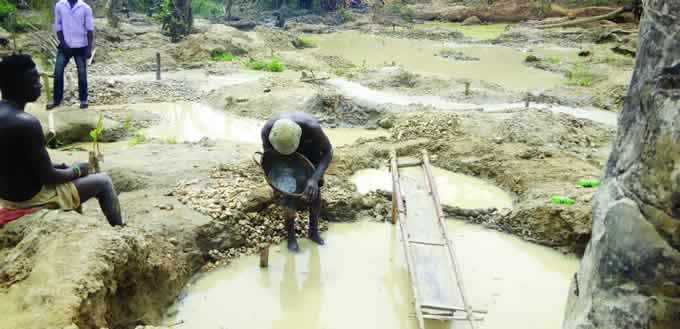
The Director-General of the Nigeria Mining Cadastre Office, Obadiah Nkom, disclosed this to journalists at the 63rd session of the State House Ministerial briefing organised by the Presidential Communications Team at the Aso Rock Villa, Abuja.
The NMCO is responsible for the management and administration of mineral titles in the country.
It was established in 2007 by the Nigerian Mineral and Mining Act 2007 with clear mandates for the administration and management of mineral titles.
The NMMA Act 2007 was re-enacted to repeal the Minerals and Mining Act No. 34 of 1999 for the purpose of regulating all aspects of the exploration and exploitation of solid minerals in the country.
In 2018, 2019 and 2020, the agency generated N1.55bn, N2.38bn and N2.57bn respectively.
However, between 2021 and 2022, its revenue plummeted from N4.3bn to N3.79bn, respectively.
Giving reasons for the revenue drop, Nkom said the latest digital upgrades on its license processing platform impeded revenue inflow as activities were suspended temporarily.
He revealed that the Cadastre Office has passed through three upgrades between 2007 to date; ensuring the migration of its licensing platform to a real-time, automated system.
“Because we are migrating to the new system, we had to do a lot of shutdowns. It happened because we were migrating to the new system. We wanted to ensure that we don’t have a system where after one day or two, we have a problem.
“We had to test-run it, shut it down at times, do a lot of things and that was what affected some of our activities in terms of revenue.
“But I can tell you with the new system, that subsequently, we are going to have a very good increase, because even at then, we were able to form about 50 per cent of the revenue of the mining sector,” he explained.
According to Nkom, 100 percent of the Office’s revenues are sent to the Treasury Single Account of the Federal Government.
He also noted that the bulk of the revenue come from application, processing and annual service fees; constituting 50 per cent of the annual revenue generated from the Federal Ministry of Mines and Steel Development.
According to him, “All payments right from the inception of the Mining Cadastre have always gone to the government. Even before the commencement of the TSA we have never had reasons to use cash as a mode of payment.
“We were using bank draft then. When TSA came in, it made it much easier and I want to put on record that 100 per cent of our revenue generated is sent straight to TSA.”
Nkom said the agency now has about 6,000 registered miners nationwide as it revoked 3,400 titles between September 2021 and September 2022.
He noted that plans to raise more revenue will necessitate revoking of more unutilised titles in 2023.
The agency will deploy the “use it or lose it” mantra to mining title/rights administration, he explained. He also revealed that miners who lost their titles defaulted in paying the mandatory annual service fees.
On its guiding principle for the allocation of mining licenses, the DG said the agency gives priority to ‘first come first served’ and ‘Use it or lose it’.
“How does the system run? It is on use-it-or-lose-it basis. We’ve had instances where people receive licenses and keep these licenses, and they don’t use them. The law is very, very clear on that. What does that mean? We give you the license. If you don’t adhere to the provisions of the Act, you lose it.
“How do you lose it? You lose it by way of revocation and it’s not arbitrary. We give you a notice of default, for you to be able to remedy the defect, we give you 30 days, in line with the law.
“You can decide to remedy the effect on the 29th day. We are fine with that. But once it is 30 days, and you don’t remedy the defects, then we revoke the title because we know that all these are subjects to litigations”, he explained.
The President, Major General Muhammadu Buhari (retd.), appointed Nkom for a second and final term of four years with effect from January 12, 2023.
Nkom who holds a Higher National Diploma in Mining Engineering from Kaduna Polytechnic, was first appointed on January 12, 2019 for an initial period of four years.





